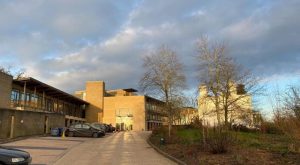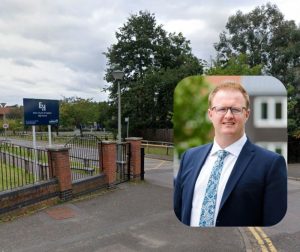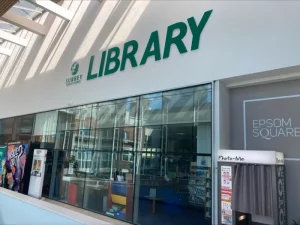A new state-of-the-art FIFA-standard 3G football pitch and pavilion has been officially opened at Glyn School in Ewell after more than £1 million of investment from national and local partners.
The Premier League, The FA and the Government’s Football Foundation contributed just over half of the total cost, with further funding from Epsom & Ewell Borough Council, Your Fund Surrey (Surrey County Council) and the Epsom & Ewell Colts. The new pitch will be used by Glyn School, other GLF Schools, Epsom & Ewell Colts FC and the wider community.
Epsom & Ewell Borough Council’s Playing Pitch Strategy and Corporate Plan identified the need for high-quality sports provision to promote healthy lifestyles, widen participation and meet the needs of a growing population. With more than 1,800 students at Glyn and around 5,000 across other GLF Schools, the facilities are expected to make a significant daily impact on school and community sport.
A partnership with Epsom & Ewell Colts FC means the pitch will become a major hub for grassroots football, supporting over 1,200 players across 82 teams, including 30 girls’ and women’s teams. The GLF Schools Foundation will help expand access for disadvantaged groups, disabled players and young people historically underrepresented in sport, aligning with both borough and national priorities for community wellbeing.
The official opening took place on Wednesday (Dec 10), with GLF Schools Interim CEO James Nicholson addressing guests and the Mayor of Epsom & Ewell, Cllr Robert Leach, cutting the ribbon. Also present were Liz Pill from the Football Foundation and Rosanne Fine from Surrey Football Association. Visitors toured the pitch and pavilion after watching players take to the new surface.
Jo Garrod, Headteacher at Glyn School, said: “This new pitch and pavilion are a fantastic addition to the sports facilities at our school and will be a huge benefit to all our students. We’re extremely grateful to the Football Foundation for the funding and investment and delighted that they have made such a significant contribution to improve the quality of sports facilities for everyone in the community.”
James Nicholson, Interim CEO of GLF Schools, said: “The range of sports and activities we offer at GLF Schools is central to the educational experience for all students. Having the latest modern facilities is key to giving every student the best opportunities to reach their full potential and enjoy their time with us. I’d like to thank The Football Foundation, whose major grant made this development possible, Epsom & Ewell Council, Your Fund Surrey (Surrey County Council), and the Epsom & Ewell Colts, who also supported this project with substantial financial contributions. As well as Surrey FA for their strategic guidance and endorsement, and all the consultants in design, fundraising, planning, and project management who worked so hard to build such an impressive pitch and pavilion.”
Robert Sullivan, Chief Executive of the Football Foundation, said: “The Football Foundation is working closely with our partners, the Premier League, The FA and Government, to transform the quality of grassroots facilities in England by delivering projects like this across the country. Good quality playing facilities have a transformative impact on physical and mental health and play an important role in bringing people together and strengthening local communities. We’re delighted that the local community in Epsom and Ewell will now be able to enjoy all these benefits thanks to the new facilities at Glyn School.”
Epsom & Ewell MP Helen Maguire said: “The opening of this new pitch and pavilion at Glyn School is a real milestone for Ewell and the wider borough. It gives young people and local clubs a first-class space to train, play, and grow – and it strengthens the role that sport can play in building confidence and aspiration, as well as the improvements it can bring to both physical and mental health. I’m delighted to see this project completed and look forward to visiting soon.”
Many local clubs, organisations and community groups provided letters of support, including NESCOT, Chelsea FC Foundation, Fetcham United FC, Active Surrey, Surrey Schools FA, Surrey Cricket Foundation and Tidy Keepers.
A 3G (Third Generation) astro pitch is an advanced artificial turf surface combining synthetic grass, sand and rubber infill to mimic natural turf, offering all-weather durability and consistent performance.
About the Football Foundation
The Football Foundation is the Premier League, The FA and the Government’s charity dedicated to delivering outstanding grassroots facilities. Since 2000 it has raised £1.3 billion to improve facilities nationwide, including 1,300 3G pitches, 15,000 grass pitches and 1,700 changing rooms, attracting an additional £1.5 billion in partnership funding. It works with local authorities, County FAs and community partners to create Local Football Facility Plans for every area of England. More information at footballfoundation.org.uk.
About GLF Schools
GLF Schools is a multi-academy trust of 43 schools serving more than 17,000 pupils aged 2 to 19 across Oxfordshire, Berkshire, Hampshire, Surrey, West Sussex and parts of London. The Trust includes eight secondary schools and 35 primary settings, each serving its own community while sharing a commitment to excellent educational outcomes.

New Pitch at Glyn School x 2. Credit: GLF Schools











